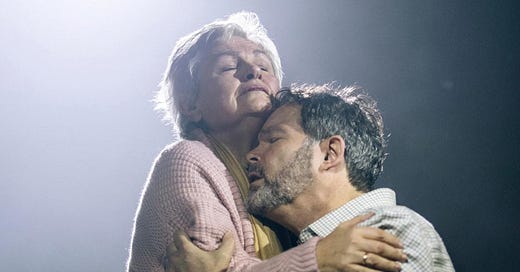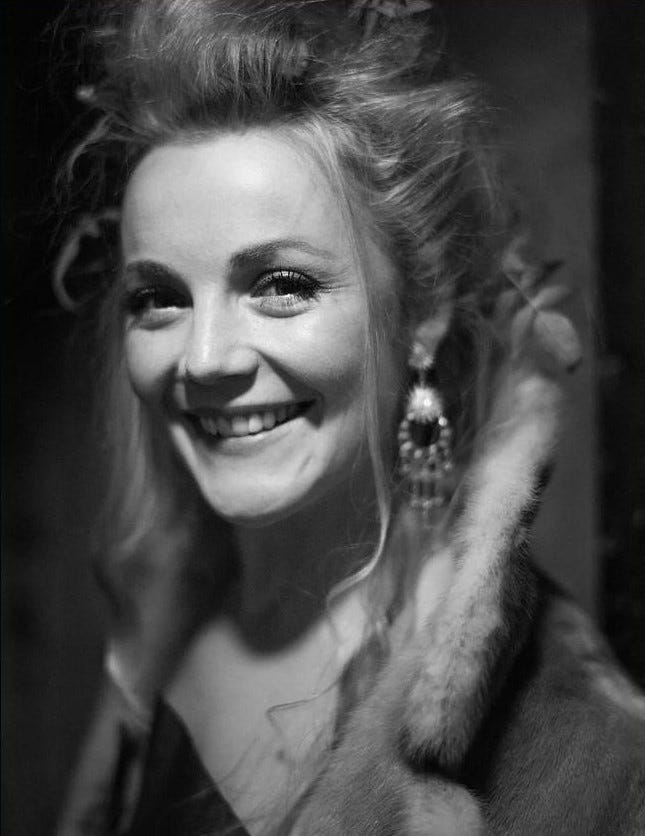A very modern Bluebeard
British opera director Daisy Evans on why we should experiment more in opera

There have been many interpretations of the tale of Bluebeard, a serial monogamist-cum-wife-murderer, but Against the Grain is about to premiere probably the most surprising one around: Bela Bartok’s Bluebeard’s Castle set in our time with the title character who’s a thoroughly nice guy. British director Daisy Evans translated the libretto to contemporary English and without changing much, staged the opera as a story of a husband caring for his wife who is succumbing to dementia. The scene in which the new bride Judith opens the doors that reveal the bodies of the past wives? That’s here the attempt of a very elderly Judith to recall her past selves. Evans’ and conductor Stephen Higgins’ Bluebeard, when it originally premiered in a smallish London venue, surprised the British press and garnered uniform acclaim. Baritone Gerald Finley will revive the role in Toronto.
How come she turned Bluebeard into a good guy, I asked Evans when we connected over Zoom earlier this week. “I listened to the music,” she says. “There’s such deep love in that music. And such depths of sadness and loneliness. And of course there are plenty of readings of Bluebeard’s Castle that say it’s actually a journey of one man into his own mind etc. But I just didn’t hear the sociopathic wife murderer in the music. Especially at the end when he opens the seventh door and the three wives are there. The way he talks about them is so loving, and so tender.” A more cynical person, she adds, could argue that a serial killer might indeed love his victims… but rather than horrify, she wanted to create a work that moves the audiences. Besides, opera has seen enough dead women. “I personally felt doing a show about a gory murder of a young virginal woman is just… too opera for me. And I didn't find that the music particularly sustained that.”
From the original libretto in Hungarian, Evans, surprisingly, did not change much. She resurfaced the softy Bluebeard, as it were, from within the text itself. “As in a lot of my translations, the words are pretty faithful to the original. I think the only line we changed is where Judith asks for “keys”, we have it as “doors”. We found a completely different camera angle to view the piece from, and yet managed to be faithful to the original.” It’s a story about two people now, not about Bluebeard solely. And no annoyingly curious ingenue will be slaughtered.
Evans is no newbie to adapting operatic classics for contemporary tastes: in 2011 she founded Silent Opera, a company that performs in nontraditional venues, with live singing to rearranged and pre-recorded orchestra that plays in headphones that members of the audience wear as they move around. Whenever she works in major operatic centres in Europe, she tells me, she realizes how timid Britain is in operatic experimentation (I suggest it’s the angloworld in general, and she doesn’t disagree.) “When I was a student, Punchdrunk was becoming quite big and there were a lot of exciting directors like Simon McBurney and Emma Rice with her company Kneehigh. They were changing the way we see and experience classic texts. And I just thought, no one’s doing that in opera. There’s nothing of that kind that I could see as a 21-yo at the ROH or the ENO. And I felt that there should be because opera is such an amazing art form and it should be experimented with just as much as theatre is experimented with.”
How do you do an immersive opera, she asked herself, when you have a huge orchestra that you can’t take around with you? “I had this idea to pre-record the orchestra, mike up all the singers, and put individual headphones on each audience member so that they walk around and they are not bound by their one fixed spot in the space of performance. And it just kind of gained momentum since then.”
Beside re-jigging the logistics of the performance, Silent Opera team are very interested in challenging the narratives that they take on. For their version of The Cunning Little Vixen originally performed in Hong Kong, the notes remain all Janacek’s but they re-orchestrated the score for a very small busking band, as well as pre-recorded electronics and a pre-recorded full orchestra. “This was a fantastic mix. It’s important to me that the music is considered dramatically as much as the setting usually is. To me it wouldn’t be interesting for ex. to watch Vixen and everybody is in street clothes and outside drinking a beer, and there’s a full orchestra. Why would a symphony orchestra be on the streets of Hong Kong? Whereas a busking band and some electronics is much more appropriate to the setting. And in Vixen when she has her big romantic moment, when she’s falling in love, that’s when we use the big orchestra, because that is how you feel in those situations.”
I ask her if she ever worries that if we start miking singers with some frequency, the freakishly impressive self-amplified operatic voice will gradually… fade away from circulation. “Not really. And in our productions they still have to perform operatically, and use their operatic voices,” Evans says. “What I've found in rehearsals when you’re sitting close to these amazing singers, the energy and the emotion that you get from them, close up, is kind of lost when you put them on an opera stage. Suddenly they’re 30 metres away from you and the gestures have to be much bigger – opera is often criticized for bad acting, but it’s become an ingrained necessity because the singers are so far away. Wouldn’t it be amazing to be close to a proper operatic performer? We are not asking them to sing less or differently with mics… we have controls of the levels obviously, but the headphones that we use are not noise-cancelling so you still get directionality and you still get twice the sound if the Vixen for example happens to be next to you.”
She is not there, she is quick to add, to challenge the big opera houses or destroy traditional opera-going. “I just think it’s so valuable for the ecology of the opera genre to have productions of all sizes. Typically our tickets cost about 30 GBP. And you’re really up close. It’s up to you how close you want to be to the performance. And if you liked it, maybe you’ll decide to buy a more expensive ticket to the ENO. All of my team are opera veterans, we’ve all done our time at the big houses, we know what we’re doing, so we show it the utmost respect.”
I ask her about the Regie approach to opera, which has been dominant in European opera centres for the very logical reason that generations upon generations of opera goers have seen traditional productions and some new approaches had to be tried out. Again, the anglo-world is a little different in that regard. Or does she think that for us the grass is always greener etc. when we look at the German and the French?
“It’s a mix of things, and it is a little ‘the grass is greener’ situation, but not entirely.” She is currently opening a new work in Bolzano, in Northern Italy, where their colleagues tell them that they’ve never worked with electronic music in opera, or with the big rig lighting, and that they are enjoying it. But that’s Italy, we agree, where the opera houses, paradoxically, since this is the birthplace of opera, are not very future-oriented. “Germany though is amazing; you can go to the opera for 10 euro on the night and sit in stalls. I always find when I’m in Germany, the audience attitude is more accommodating because there’s such good state funding of the arts, the families don’t mind if they go see something which they hated, they only spent ten euros each. They may leave at the interval or be angry but they have an environment of encouraging experimentation there. Some of the traditional things that I see in the UK I think would never be staged in Germany because they have that already, and had it for some time. I feel a little embarrassed as a British practitioner about our opera scene; I think we should be experimenting more, and this is crazy because our theatre scene is so experimental. And we have such a strong narrative tradition that I'm shocked that opera doesn’t capitalize on that in the UK, and reach out to the theatre-going audience. We have a very strong theatre-going audience. We were worried after covid and now the cost of living crisis, but shows are selling out, people are going out to see things. I’ve just opened a tour of The Magic Flute with the WNO which is almost sold out.”
Does Silent Opera get any grants, how does that work? “No, we mainly get funding per production and we do it by co-producing and touring. We get no public funding but if we continue to grow, that will change. Right now we are looking to co-produce before we look to get any grants. And also corporate sponsorship. There’s plenty of tech companies that want to work with us. We often get support in kind. Also, venue partnerships. There are deals to be done that are not primarily financial that we as a small, nimble company can take advantage of.”
Before I let her go, I ask her what she’s working on in Italy at the moment. “It’s a brand new opera, with music by Wolfgang Mitterer and the libretto by David Pountney: Peter Pan / The Dark Side. A new interpretation of Peter Pan, but more as Wendy’s story. It’s about a young girl living in a modern world who’s completely obsessed with the internet and the unreal world of Instagram and social media. She views that world as a kind of Neverland. This potential predator is never made clear, but this Peter Pan figure reached out to her through the internet and she follows him on the journey through the Neverland where she meets lost boys, pirates and all the rest. It’s the kind of thing I like to do: retell old, well-known stories in a very different key.”
Bluebeard’s Castle is at the Fleck Dance Theatre March 29 and 31, and April 1.



